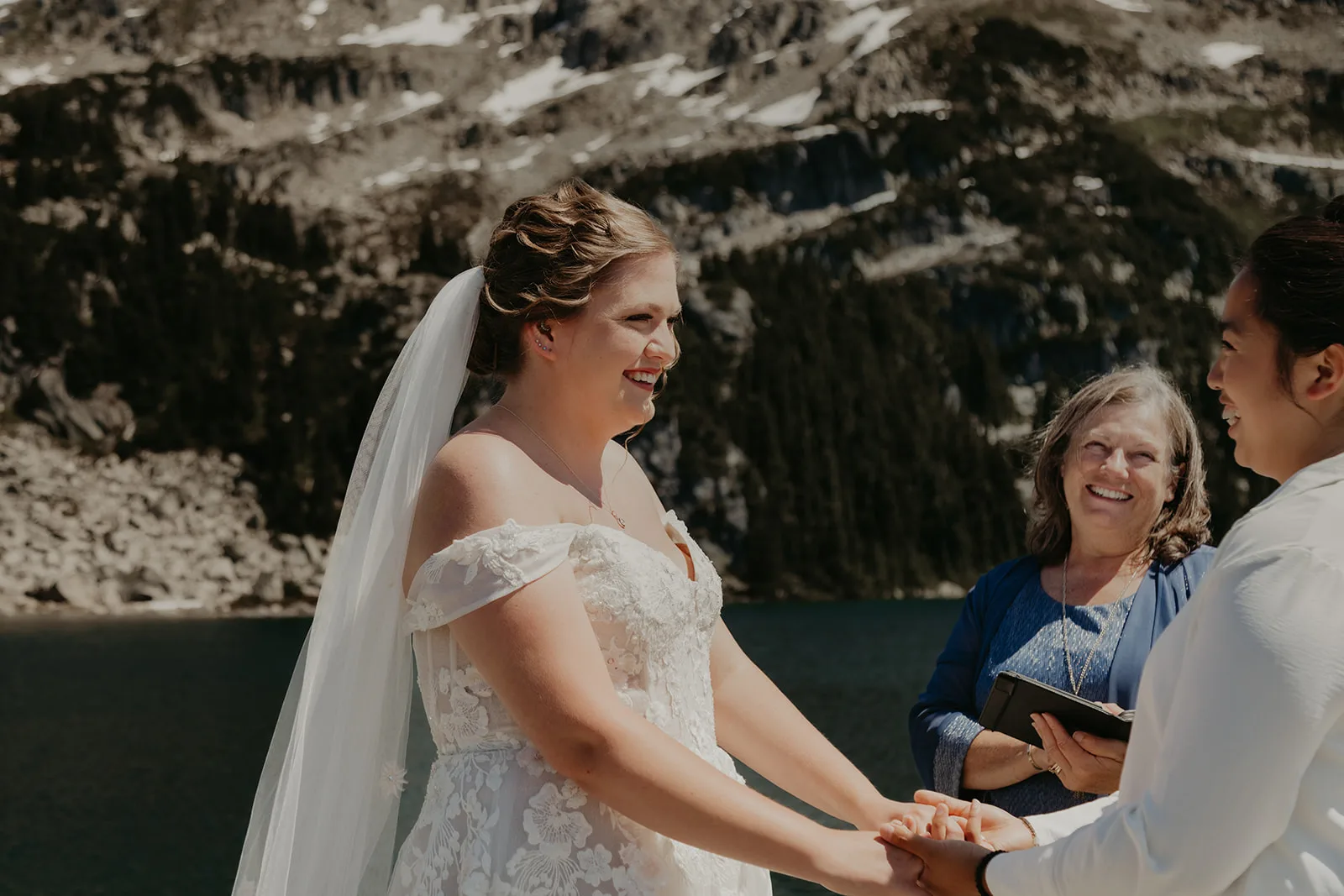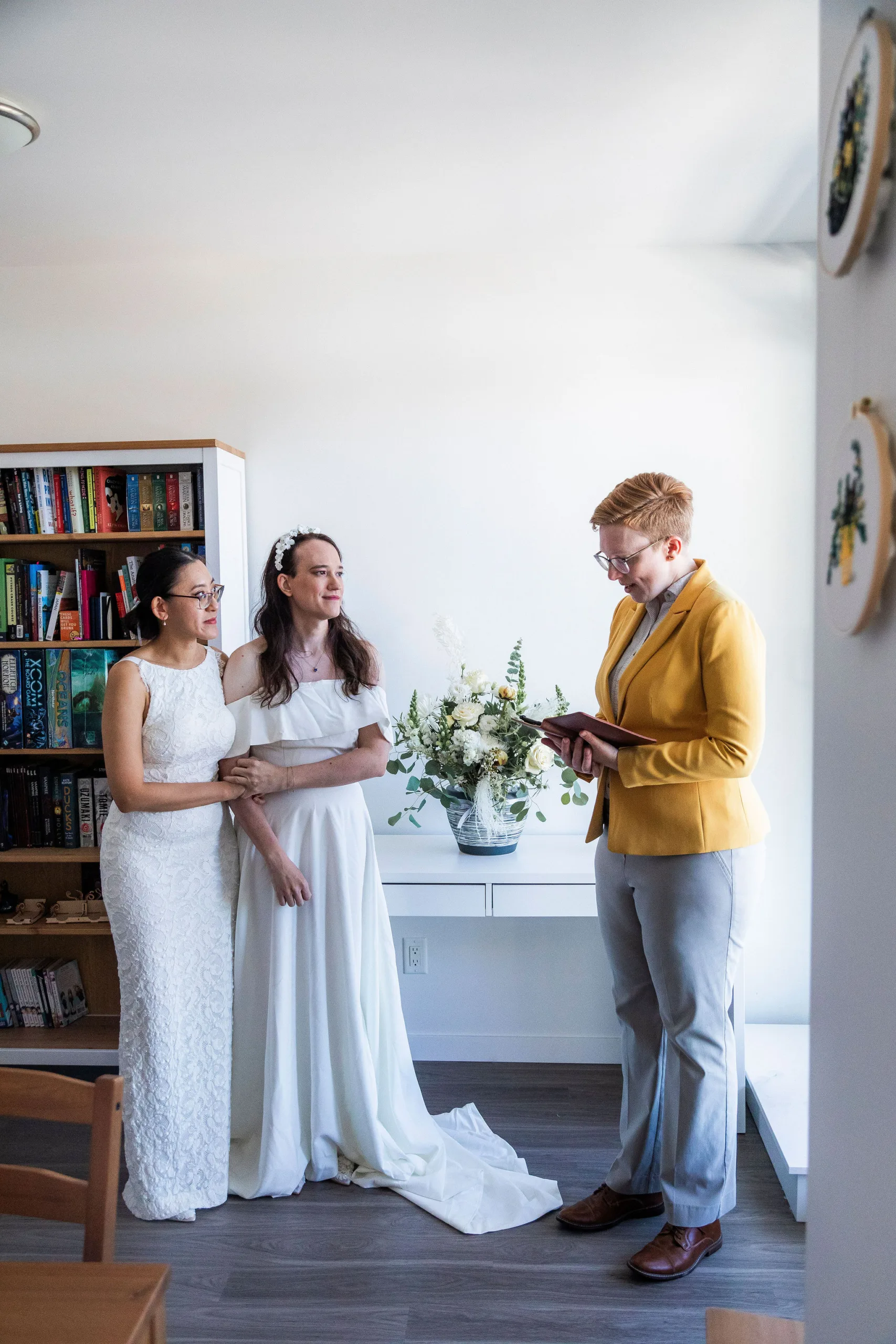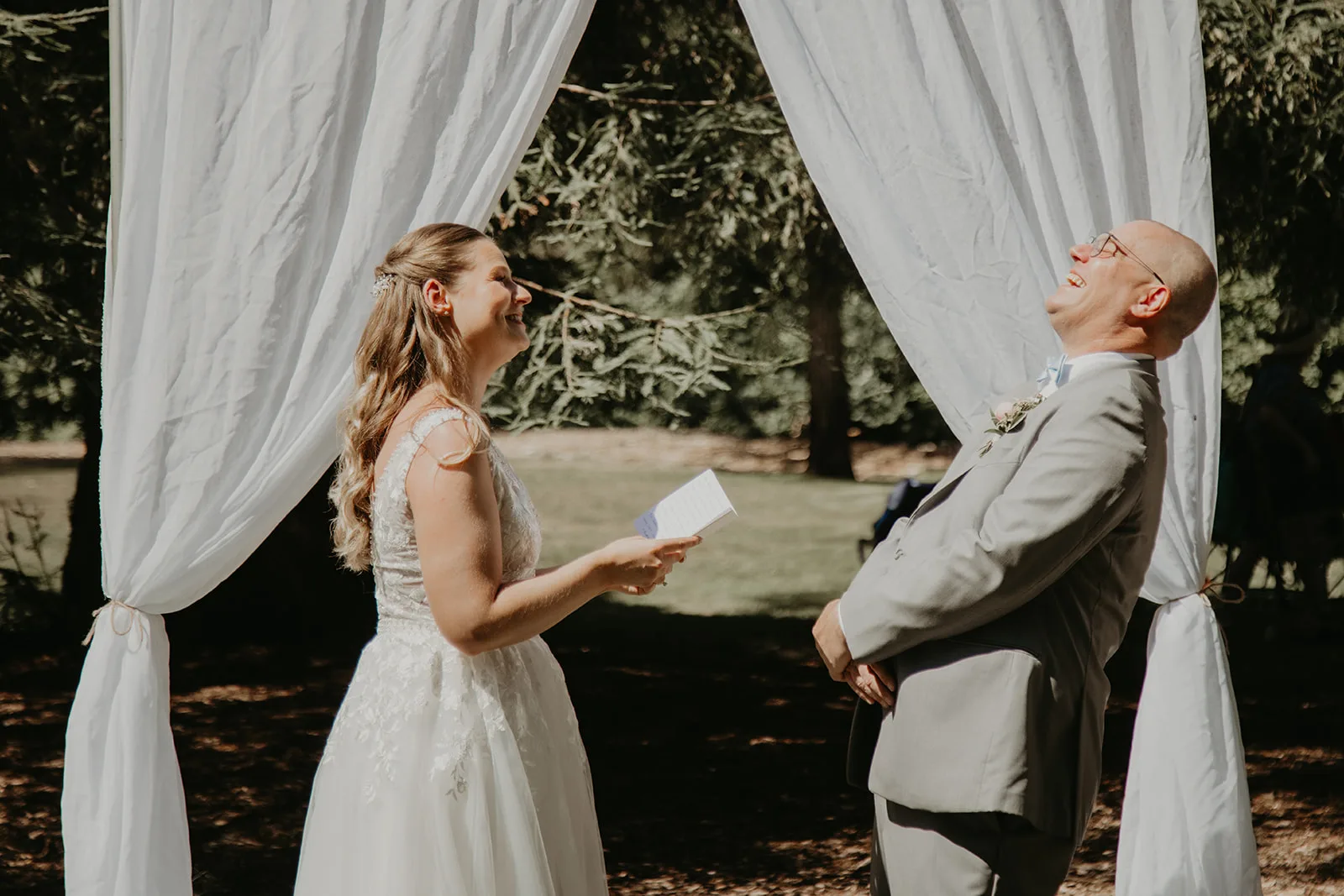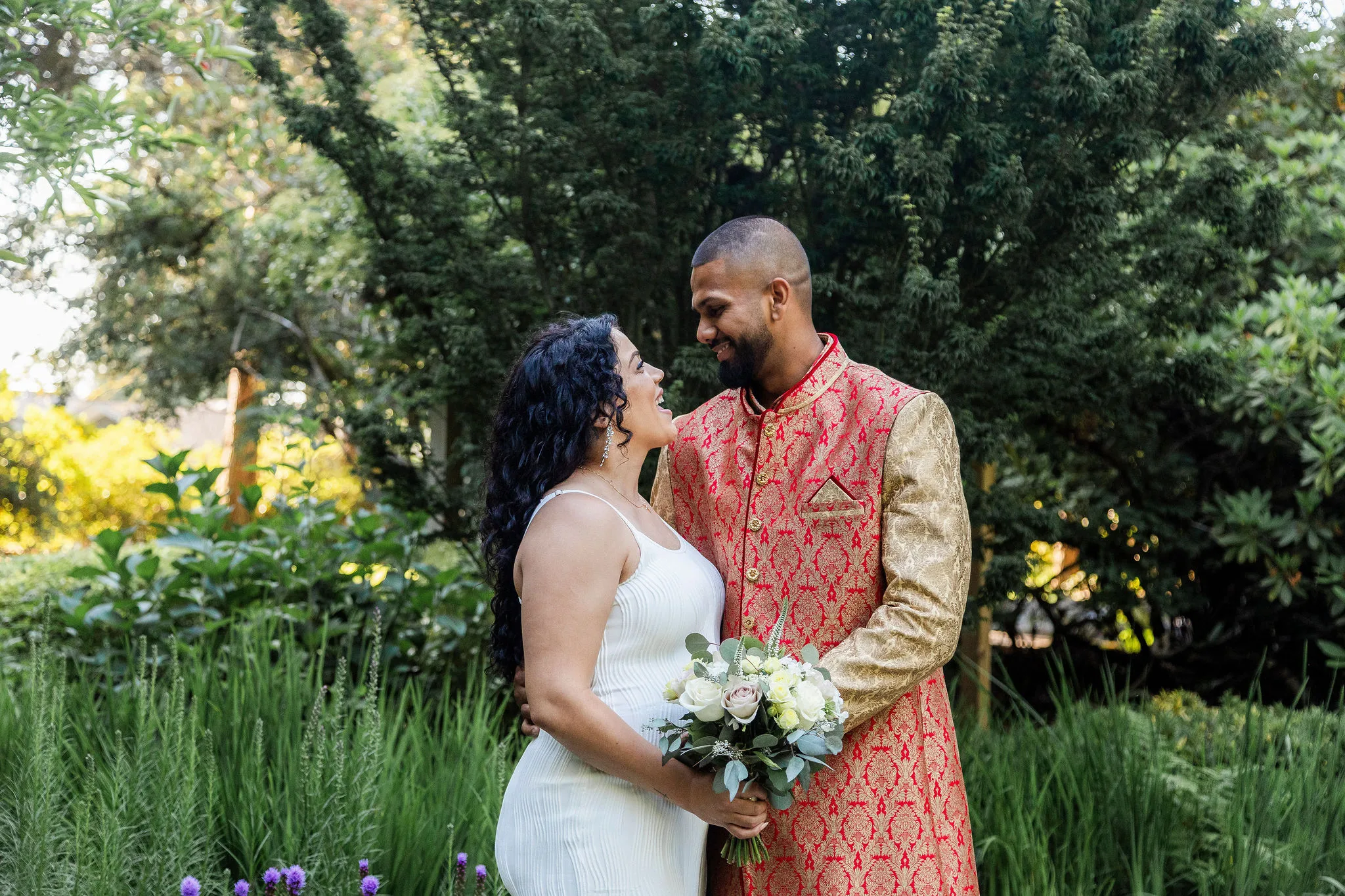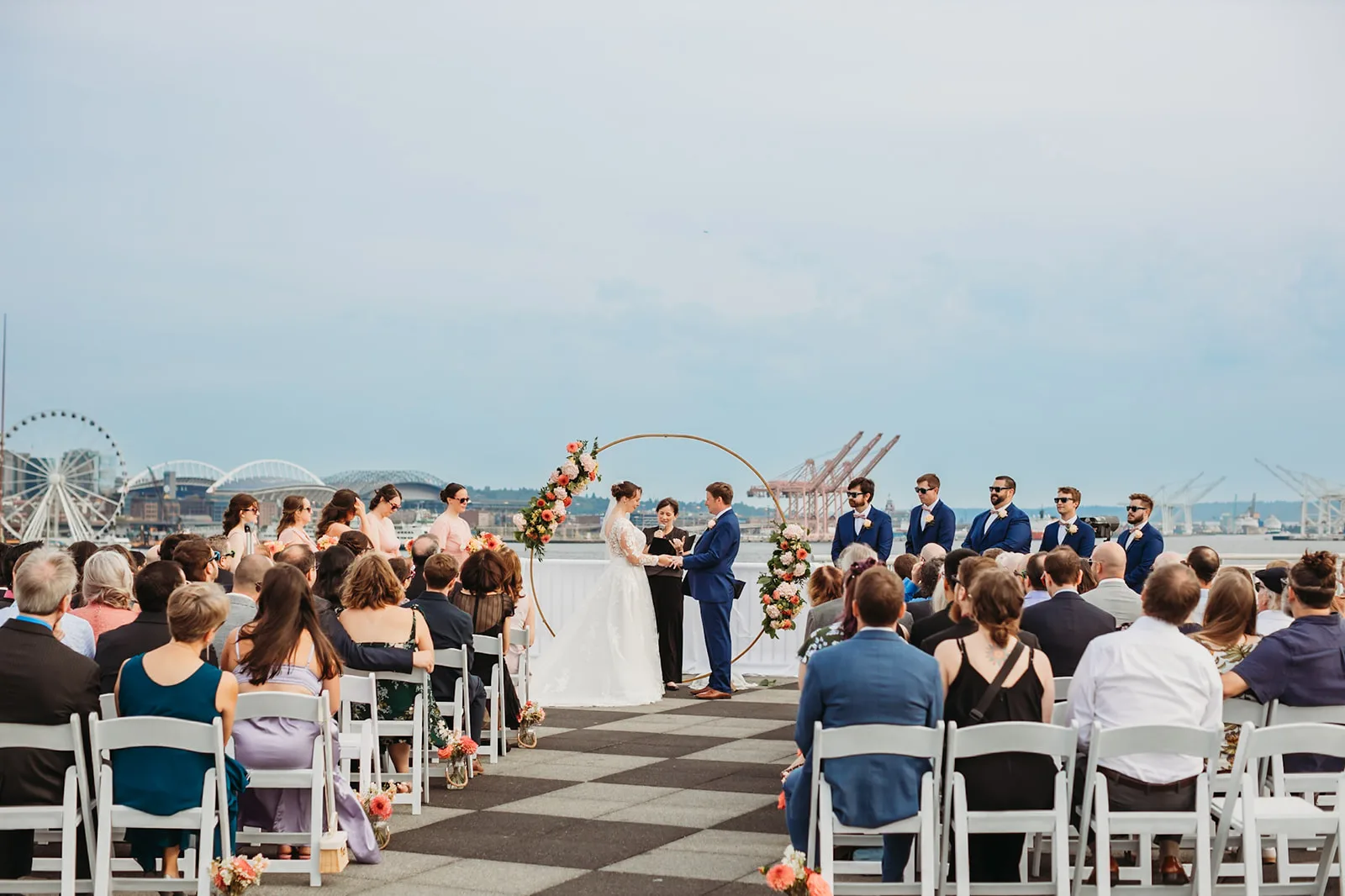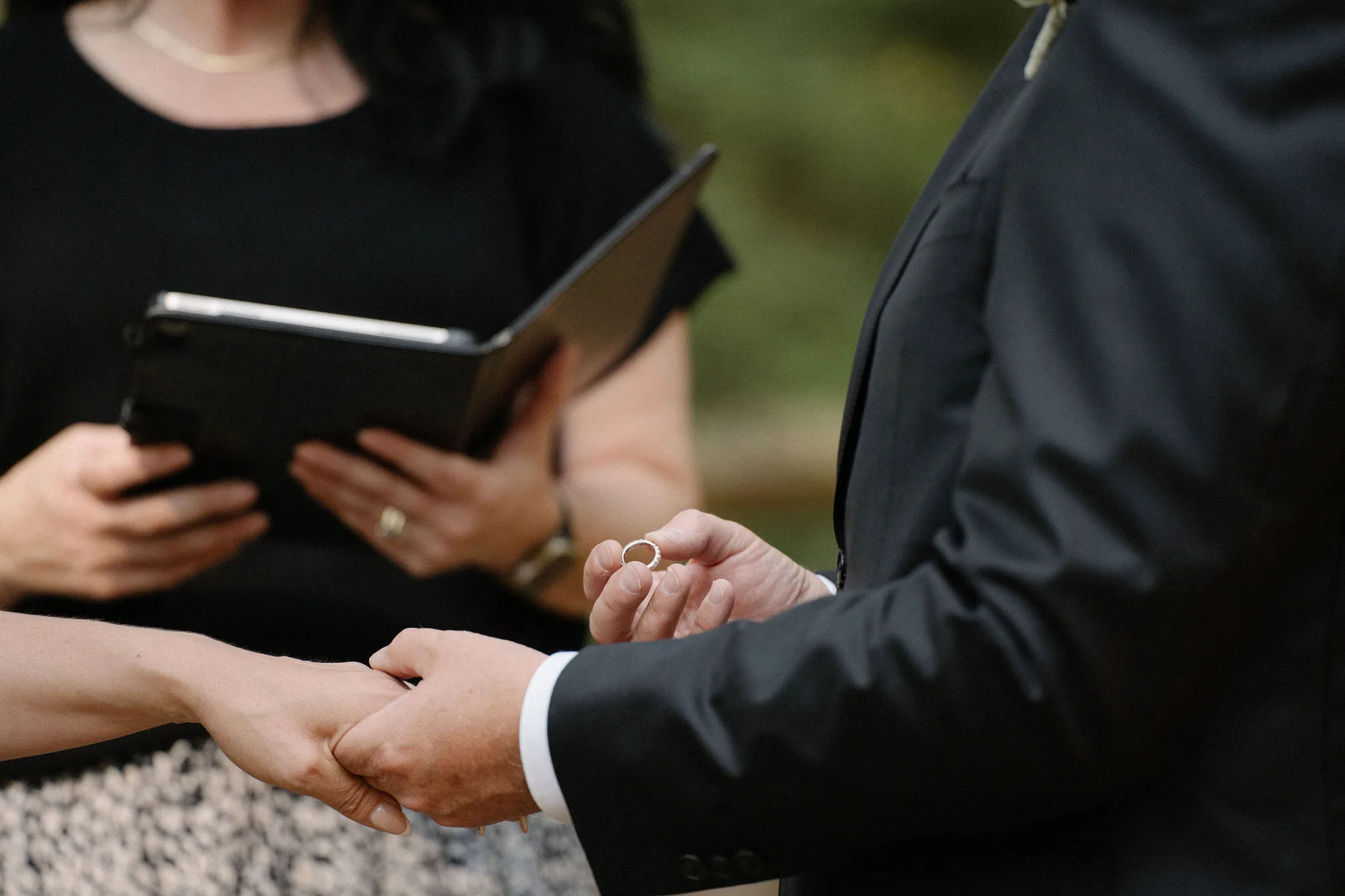You’re getting married, congratulations! But who is going to marry you?
Turns out, you have a few options. There are a number of different types of wedding officiants, commissioners, religious and civil officers, and licensed people who can legally marry you during your wedding ceremony.
Keep in mind that some of these positions overlap – a professional wedding officiant could also be a non-denominational officiant or a ship captain (more on that later!).
You also want to keep the location of your ceremony in mind. Not all of these positions have the power to marry you everywhere. What’s available in one jurisdiction may not be available in another. For example, if you’re looking at who can perform a marriage in BC, you’ll find that judges and friends who get ordained online are not an option.
Bottom line: You want to find the right officiant for you – someone who can legally marry you in your area and honour your wishes. This person should be able to create your dream ceremony whether that’s a quick signing ceremony, religious or spiritual ceremony, intimate elopement or full-on custom ceremony written just for you two!
Let’s get to know the 11 different types of wedding officiants and other people who can marry you:
1. Professional wedding officiant
Hello, you’ve found us! All of the officiants at Young Hip & Married are professional wedding officiants. A professional wedding officiant is someone who is licensed to legally marry you and who has undergone specific training to become an officiant. Officiating is often their full-time job or a significant part-time job.
While all wedding officiants are different, at Young Hip & Married, we pride ourselves on creating ceremonies that cater to our couples wants and needs. There’s nothing cookie cutter here!
If you want to elope on top of a mountain after an epic helicopter ride, check out our Adventure Elopements. If you want to gather in your local park or favourite beach with a few friends and have the photos to remember it all, check out our Intimate Elopement + Photography package.
And, of course, if you want a personal ceremony that has been custom written for you to tell your love story, you’ll want to check out our Custom & Creative Ceremony!
2. Marriage commissioner
A marriage commissioner is a government official who is licensed to legally marry couples. Because they are government employees, they don’t have as much freedom as wedding officiants.
Commissioners are only able to marry people in specific geographic locations. They must be retired or semi-retired and they charge a flat rate set by the government. Many commissioners do not offer the option to customize your ceremony script or include any creative additions.
While commissioners are generally more affordable than officiants, they typically do not offer as many options to personalize your ceremony. Check out more differences between marriage commissioners and wedding officiants to find out which one is right for you.
3. Marriage celebrant
A marriage celebrant is actually another term for a wedding officiant. The word “celebrant” is more popular in Australia, New Zealand and the United Kingdom while “officiant” is more popular in the US and Canada. But generally speaking, “celebrant” and “officiant” are interchangeable.
However, you do want to double check that your marriage celebrant is a licensed officiant if you’re looking to be legally married. While professional officiants are almost always licensed, not all celebrants are. Some celebrants offer their services in strictly a ceremonial capacity but don’t have the legal authority to marry you.
4. Religious minister
A religious minister or ordained minister is someone who is licensed through their religious body to marry couples. Many priests, rabbis, pastors, imams and other religious leaders offer this service to members of their church/mosque/synagogue/etc.
Because this person is a religious leader and licensed through their religious body, they almost always perform religious ceremonies. You may need to be a member of their specific institution or practice the same faith in order to have them officiate your ceremony.
Obviously choosing a religious minister for your wedding is best for couples who are a part of that same religion. If you’re not religious or come from two different religions, you may prefer to work with a professional officiant who can incorporate as much or as little religion into your ceremony as you’d like. More on that in the next category!
5. Non-denominational officiant
A non-denominational wedding officiant is an officiant who performs ceremonies that don’t align with any specific religious denomination. This could either mean a generally religious ceremony but without a specific denomination (e.g. a Christian ceremony but not specifically Catholic) or a completely non-religious/secular ceremony.
At Young Hip & Married, all of our officiants offer non-denominational and non-religious ceremonies. Regardless of their personal faith, they’d be happy to incorporate as little or as much of your chosen religious or spiritual practices as you’d like. Our default is to not include religion in a ceremony unless requested to do so.
This is a great option for non-religious couples, religious/spiritual couples who aren’t connected to a specific denomination, or couples who come from two different religions. Our officiants have experience blending religions, cultures and traditions to create a ceremony that is inclusive of both of you and your families.
6. Justice of the peace
A justice of the peace is a judicial officer and the public’s first point of contact with the legal system. As well as scheduling trial dates and handling minor traffic infractions, a justice of the peace may be able to legally marry you.
Keep in mind that justices of the peace are not able to marry couples in all jurisdictions. For example, this is not an option in British Columbia. Check that this is an option in your ceremony location before moving forward.
7. Court clerk
A court clerk provides administrative support to all levels of the court. They maintain files, collect fees and, in some jurisdictions, are able to legally officiate weddings.
Like with a justice of the peace, this option is not available in all areas. Check with your local court before you make any plans.
Most ceremonies officiated by civil officers, such as court clerks and justices of the peace, are non-religious. They focus on the legally binding aspects of marriage and often don’t have room for personalization with readings, unity ceremonies, etc.
8. Judge
A judge, as you probably know, conducts trials. In some areas, they are also able to perform legal wedding ceremonies. This is most often seen in courthouse or city hall weddings.
Once again, you’ll need to check the rules for your specific jurisdiction. While we’ve all seen courthouse weddings on TV or in the movies, they aren’t always an option in real life. You can’t always run down to city hall and elope.
Similar to other civic ceremonies, a ceremony officiated by a judge will likely be short and not have options for personalization. This is ideal for a couple looking for an affordable and legal way to tie the knot and who don’t want to customize their ceremony script.
9. Notary public
A notary public is a public legal officer who handles non-contested legal services such as preparing wills and the paperwork for real estate transactions. In some jurisdictions, a notary public can also marry you by legally signing your marriage licence.
As we’ve mentioned, this is not possible in all jurisdictions. Notaries public are not able to legally conduct wedding ceremonies in all areas.
Couples who want to get married with as little fanfare as possible – who simply want to sign some paperwork in an office – may choose to be married by a notary public. This is definitely one of the most discrete ways to tie the knot!
10. Friend or family member
One of the most talked about ceremony options is to have a friend or family member go online, get licensed and be legally able to marry you. But hold on! It might not be that easy and it might not be the best idea.
For starters, not all jurisdictions allow ordinary civilians to go online and get ordained or licensed to marry couples. In most of Canada, this is not an option.
Secondly, even if this is an option in your area, it might not be the right call. While your friends and family members know you, they don’t know weddings. They may miss important parts of the ceremony, forget to cue the DJ, turn your love story into a comedy roast, get nervous and speak too fast, or make it all about them.
A lot can go wrong when you choose a friendor (friend + vendor) for your wedding instead of a professional. They don’t have the experience and it can be awkward to give them feedback. Do you really want to risk one of the most important parts of your special day?
Plus, if you go with a professional wedding officiant, your friends and family members can still be involved in your ceremony. You can ask loved ones to come up and deliver a reading, say a wedding prayer, help you light your unity candle or even give a ceremony toast.
PS: Still want to have a friend marry you? At least get them some professional help! Check out our Custom Script package where our officiants will write your script and your friend can deliver it.
11. Bonus: What about a ship captain?
Remember when Jim and Pam from The Office got married on a boat in Niagara Falls because everyone knows ship captains have the power to marry people? Yeah, turns out that might not be true…
Despite being a popular TV/movie trope, ship captains in most areas of the world cannot marry couples strictly based on their job or maritime licence. So looks like Elizabeth Swan and Will Turner weren’t legally married in Pirates of the Caribbean 3!
However, because this is such a popular myth and because so many couples do want to get married at sea, some ship captains get licensed and are able to legally marry couples. They may have become licensed through their religious body, local government or online like an ordinary civilian.
Once again, we’ll remind you to double check that this is a legal option for you before you set sail. Ask whether the captain is licensed and where your marriage would be legally registered.
Learn more about wedding officiants with these posts:
- What Does a Wedding Officiant Do?
- How to Find a Wedding Officiant
- How to Choose Your Wedding Officiant
- 15 Questions to Ask Your Wedding Officiant Before You Book
- How Much Does a Wedding Officiant Cost and Why?
- Wedding Officiant Speeches: What Does a Wedding Officiant Say?
- Do I Need a Wedding Officiant? And Other Officiant FAQs
- How to Find a Licensed Wedding Officiant in BC
- Bilingual Wedding Officiant Tips for a Bilingual Wedding Ceremony
- Your Guide to Wedding Officiant Outfits
- Your Guide to Wedding Officiant Gifts
